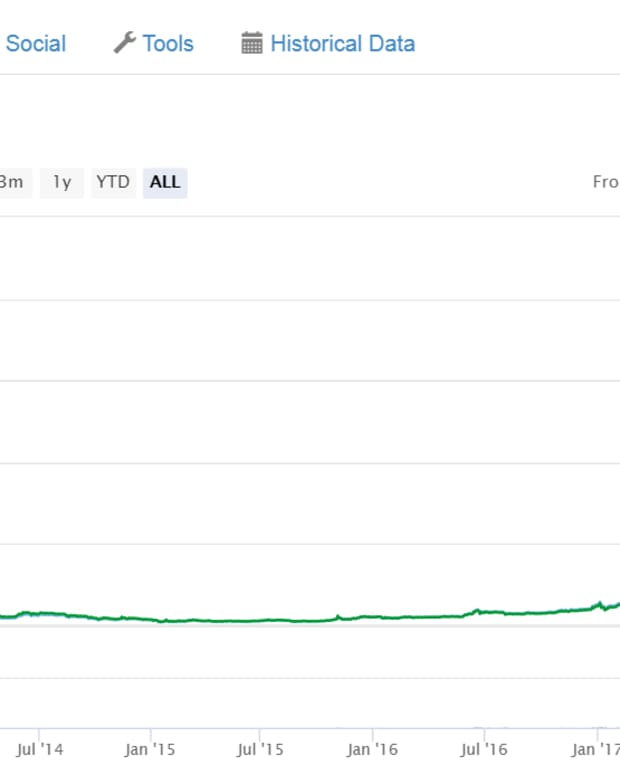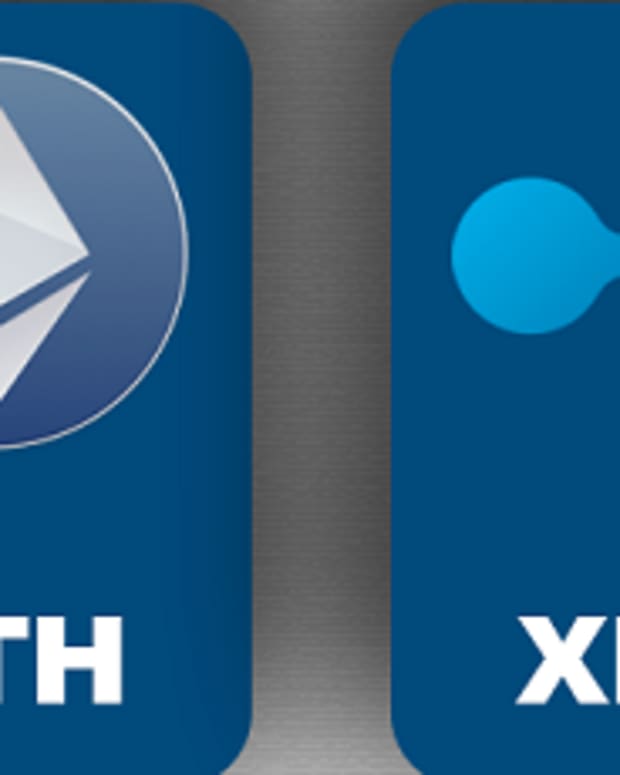Will Bitcoin Be the Leading Cryptocurrency in the Future?
I find cryptocurrencies to be fascinating. I have been following Bitcoin's development closely since 2011, as I saw the big potential of it.
Bitcoin is not only the first cryptocurrency, it is also the leading cryptocurrency by any measure from price to market capitalization to trading volume and interest. However, despite its seemingly insurmountable lead over its cryptocurrency competitors that have arisen over the years, there are legitimate reasons to question whether Bitcoin will be the leading cryptocurrency in the long run, as the market for these computer-based digital currencies matures. There are a number of reasons why Bitcoin may not be able to capitalize on its substantial lead and remain the leading cryptocurrency in the long run. Bitcoin’s shortcomings are important to understand for anyone considering making a long-term investment in Bitcoin or the emerging cryptocurrency financial sector.
Bitcoin Resides Within a Computer Network

Bitcoin does not have physical coins. The digital currency resides within a network of computers that verify and record Bitcoin transactions.
Bitcoin.com
Bitcoin’s Usefulness As a Currency Is Becoming Doubtful
比特币被设计作为一个替代选择currency to traditional government issued currencies. Part of its design and its original appeal was that it uses an independent network of computers to transact currency transfers among parties rather than traditional banks and financial institutions, by using a public ledger to record transactions, which is called the “blockchain.” Theoretically, this direct “peer to peer” computer transfer of currency is supposed to be fast and inexpensive enough to use for ordinary everyday transactions, such as buying groceries or a shirt at a retail outlet. However, as Bitcoin has grown explosively in popularity over the years, it has outgrown its ability to be used for ordinary everyday transactions, due to inadequacies in its design. It is unclear whether the Bitcoin development community can come to an agreement and properly address the real threat these inadequacies present to its dominance as the leading cryptocurrency in the long run.
Bitcoin’s Shortcomings as a Currency
Bitcoin’s shortcomings as a real-world practical currency that people can use to transact everyday commerce are numerous, and should be a concern to anyone invested in Bitcoin or considering investing in it. Here is a list of them:
- Processing transactions is too slow; taking up to 10 minutes to complete or even longer.In the modern era of lighting speed e-commerce and instantly approved credit card purchases, ten minutes is an unacceptably long time to wait to confirm an everyday purchase.
- The fees associated with completing a transaction are too high to be practical in the real world of commerce.With fees that are much higher than traditional credit cards, there is no chance that Bitcoin will be a big player in commerce until the fees can be brought back down to Earth.
- The price is too high.An electronic currency that trades in the tens of thousands of dollars may be useful to buy large ticket items such as cars and homes, but such lofty price levels make Bitcoin impractical for more mundane and inexpensive daily purchases.
- The price fluctuates too rapidly.While rapid price fluctuations of five to twenty percent in a trading day may be a daytrader’s dream, it makes Bitcoin difficult to use to complete a transaction or as a method of installment payments.
- The Bitcoin developer network is too disorganized to make needed upgrades.By its design, changes to Bitcoin must be agreed upon by a wide variety of developers that are part of the network. Making necessary changes to improve Bitcoin and upgrade it to newer more efficient standards has been difficult, since gaining a consensus to make changes is not an easy task and is prone to failure. If Bitcoin’s developers continue to fail to act on needed improvements, they will open up opportunities for other cryptocurrencies to gain technological advantages over Bitcoin that may cause Bitcoin to lose its standing as the king of cryptocurrencies.
The shortcomings outlined above are real impediments to Bitcoin being adopted as a major currency used by people in everyday commerce, once the market for digital currencies has matured and gone mainstream. The reality is that the rest of the world is not standing still. Bitcoin has thousands of cryptocurrency competitors that are finding ways to solve the various shortcomings that limit Bitcoin’s adoption as a practical currency. If Bitcoin had a traditional management structure, perhaps these shortcomings could be solved by smart top-down decisions and changes to the design of the currency. However, as outlined in item five above, Bitcoin relies upon a consensus among developers to make changes that could improve the currency’s chances of being a useful tool for commerce in the long run. The far-flung community of Bitcoin developers have already failed to come to a consensus regarding some much-needed improvements, such as making blocks of data bigger, so that transactions can be processed faster.
Bitcoin Cash Is a Breakaway Cryptocurrency That Addresses Many Shortcomings
Some Bitcoin developers got fed up with the lack of movement towards allowing bigger data blocks to store more transaction data and formed their own cryptocurrency known as Bitcoin Cash, which broke away from the Bitcoin blockchain. The developers who formed Bitcoin Cash wanted to change Bitcoin’s protocol, so that blocks would be able to hold up to eight megabytes of data, rather than just one. This was a good idea that is necessary to speed up the processing of Bitcoin transactions, because an eight megabytes block can hold a lot more transaction information than a one megabyte block. However, those who wanted to keep Bitcoin as it was originally designed did not agree to this needed change to accomodate more transaction as the number of Bitcoin users grow. So, instead of living with the status quo, a group of developers did what is a called a “hard fork” in the Bitcoin blockchain and created Bitcoin Cash, which processes transactions in eight megabyte blocks.
Bitcoin Cash Wants to Overtake Bitcoin

The developers of BItcoin cash want to overtake Bitcoin's lead by providing a faster less expensive version of the digital currency.
cryptopost.com
Cryptocurrencies That Might Challenge Bitcoin’s Lead
There are plenty of alternative cryptocurrencies that have teams of smart developers behind them that are developing ways to provide digital currency transactions in much faster and less expensive ways than Bitcoin. Many of these up and coming digital currencies also have developer teams with the flexibility to make change improve their currencies in the future, which appears the Bitcoin core developer team lacks. It is these upstart cryptocurrencies that pose the biggest threat to Bitcoin’s long term prospects for dominating the world of digital currencies.
The following is a list of cryptocurrencies that may someday rival Bitcoin:
- Bitcoin Cash (BCH) was created by former Bitcoin developers. The main advantage Bitcoin Cash has over Bitcoin is that it uses larger block sizes, so it can process transactions faster and for lower fees.
- Litecoin (LTC) is nicknamed “Bitcoin Silver.” It has garnered a lot of attention for being faster and less expensive to use than Bitcoin. It was one of the original cryptocurrencies that was developed a few years after Bitcoin’s release.
- Ethereum (ETH) is a decentralized computing platform that is used to develop and run computer applications. It has a cryptocurrency that has gained a lot in value and is often ranked in market cap second only to Bitcoin.
- Cardano (ADA) has also developed a decentralized computing platform. Cardano has a cryptocurrency that verifies transactions via a “proof of stake” technology that does not require energy-intensive “proof of work” protocol that Bitcoin uses.
- Ripple (XRP) is targeting major financial institutions and businesses that need to exchange large amounts of currency throughout the world. Their very fast cryptocurrency exchange system provides much faster transaction confirmations than Bitcoin.
- IOTA (MIOTA) uses an ledger system called Tangle that is an alternative to Bitcoin’s blockchain technology. IOTA is powered by and tied into the Internet of Things.
- Dash (DASH) offers “Digital Cash” in the form of a cryptocurrency. It focuses on privacy and providing anonymous currency transactions.
Read More From Toughnickel
Feel free to add any cryptocurrencies you think may one day revival Bitcoin in the comments section.
Ripple XRP Is a Fast and Inexpensive Cryptocurrency

Some predict that Ripple XRP might have what it takes to overtake BItcoin, due to its fast and cheap transactions.
www.ripplecoinnews
The Cryptocurrency Race To The Top Poll
Q & A - Will Bitcoin remain the dominant Cryptocurrency?
To Learn More About Cryptocurrencies, See the Article Below
- What Is Bitcoin and What Is a Cryptocurrency or Digi...
With all the talk in the media about Bitcoin and cryptocurrencies, many people are wondering just what these new computer traded currencies are. Develop an understanding of cryptocurrencies.
This article is accurate and true to the best of the author’s knowledge. Content is for informational or entertainment purposes only and does not substitute for personal counsel or professional advice in business, financial, legal, or technical matters.
© 2017 John Coviello
Comments
John Coviello (author)from New Jersey on January 25, 2018:
What did you decide Angel? Did you invest in Bitcoin or not? I think I'd invest in another cryptocurrency that has faster transactions and lower costs, but perhaps Bitcoin will do well since it has limited supply and is the most well known crypto.
Angel Guzmanfrom Joliet, Illinois on December 24, 2017:
I've given thought to investing in Bitcoin.
John Coviello (author)from New Jersey on December 23, 2017:
Thanks Mary. I'm glad you learned some more about cryptocurrencies by reading this article. You may also want to read my first article about cryptocurrencies, which explains what Bitcoin and cryptocurrencies are, "What Is Bitcoin and What Is a Cryptocurrency or Digital Currency."
Mary Nortonfrom Ontario, Canada on December 23, 2017:
我真的远离cryptocurrencies但是现在I have read your article, I know a bit more. This is very enlightening. I was not even aware there were other cryptocurrencies out there.


















